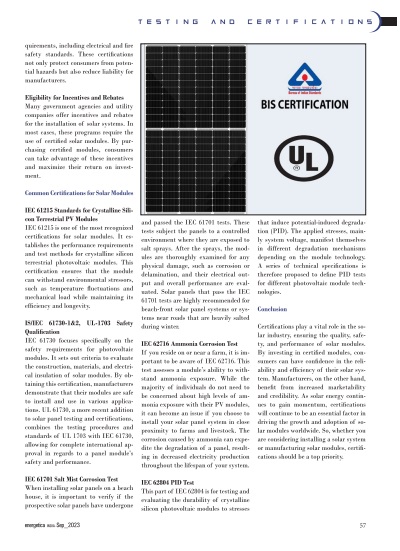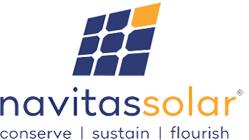Solar Revolution: The Vital Role of Certifications For Solar Modules

Empowering the Solar Revolution: The Vital Role of Certifications in ensuring Reliable & High Performing Solar Modules
Introduction
In the fast-paced world of solar energy, certifications play a crucial role in ensuring the reliability and performance of solar modules. As technology continues to evolve, it becomes increasingly important to invest in certified products that adhere to industry standards. In this article, we will explore the significance of certifications for SOLAR modules and how they can benefit both manufacturers and consumers.
In terms of certification, the design qualification is determined through type testing according to standards such as IEC, EN, or other national standards. In India, the Bureau of Indian Standards (BIS) is responsible for certification. It is important to note that the terms “IEC certification” or “IEC certificate” are misleading, as the International Electrotechnical Committee (IEC) is not a certification body but an standards designing body. The Ministry of New & Renewable Energy (MNRE) has introduced a Compulsory Registration Scheme for solar module manufacturers under the Approved List of Modules & Manufacturers (ALMM) to decrease India’s reliance on solar product imports and promote self-reliance. BIS certification is optional for manufacturers.
Why Certifications Matter
Ensuring Quality and Performance
Certifications act as a seal of approval for SOLAR modules, assuring consumers that the product meets stringent quality and performance standards. Through rigorous testing, certifications validate the reliability, efficiency, and durability of solar modules. By investing in certified modules, consumers can have peace of mind knowing that their solar system will deliver optimal performance over its lifespan.
Compliance with Safety Regulations
Solar modules are subjected to various safety regulations to ensure the protection of both consumers and installers. Certifications validate that a solar module meets all necessary safety requirements, including electrical and fire safety standards. These certifications not only protect consumers from potential hazards but also reduce liability for manufacturers.
Eligibility for Incentives and Rebates
Many government agencies and utility companies offer incentives and rebates for the installation of solar systems. In most cases, these programs require the use of certified solar modules. By purchasing certified modules, consumers can take advantage of these incentives and maximize their return on investment.
Common Certifications for SOLAR Modules
IEC 61215 STANDARDS FOR CRYSTALLINE SILICON TERRESTRIAL PV MODULES
IEC 61215 is one of the most recognized certifications for solar modules. It establishes the performance requirements and test methods for crystalline silicon terrestrial photovoltaic modules. This certification ensures that the module can withstand environmental stressors, such as temperature fluctuations and mechanical load, while maintaining its efficiency and longevity.
IS/IEC 61730-1&2, UL-1703 SAFETY QULIFICATION
IEC 61730 focuses specifically on the safety requirements for photovoltaic modules. It sets out criteria to evaluate the construction, materials, and electrical insulation of solar modules. By obtaining this certification, manufacturers demonstrate that their modules are safe to install and use in various applications. UL 61730, a more recent addition to solar panel testing and certifications, combines the testing procedures and standards of UL 1703 with IEC 61730, allowing for complete international approval in regards to a panel module’s safety and performance.
IEC 61701 SALT MIST CORROSION TEST
When installing solar panels on a beach house, it is important to verify if the prospective solar panels have undergone and passed the IEC 61701 tests. These tests subject the panels to a controlled environment where they are exposed to salt sprays. After the sprays, the modules are thoroughly examined for any physical damage, such as corrosion or delamination, and their electrical output and overall performance are evaluated. Solar panels that pass the IEC 61701 tests are highly recommended for beach-front solar panel systems or systems near roads that are heavily salted during winter.
IEC 62716 AMMONIA CORROSION TEST
If you reside on or near a farm, it is important to be aware of IEC 62716. This test assesses a module’s ability to withstand ammonia exposure. While the majority of individuals do not need to be concerned about high levels of ammonia exposure with their PV modules, it can become an issue if you choose to install your solar panel system in close proximity to farms and livestock. The corrosion caused by ammonia can expedite the degradation of a panel, resulting in decreased electricity production throughout the lifespan of your system.
IEC 62804 PID TEST
This part of IEC 62804 is for testing and evaluating the durability of crystalline silicon photovoltaic modules to stresses that induce potential-induced degradation (PID). The applied stresses, mainly system voltage, manifest themselves in different degradation mechanisms depending on the module technology. A series of Technical Specifications is therefore proposed to define PID tests for different photovoltaic module technologies.
Conclusion
Certifications play a vital role in the solar industry, ensuring the quality, safety, and performance of SOLAR modules. By investing in certified modules, consumers can have confidence in the reliability and efficiency of their solar system. Manufacturers, on the other hand, benefit from increased marketability and credibility. As solar energy continues to gain momentum, certifications will continue to be an essential factor in driving the growth and adoption of solar modules worldwide. So, whether you are considering installing a solar system or manufacturing solar modules, certifications should be a top priority.


 Online | Privacy policy
Online | Privacy policy
Related Posts
You May Also Like
Bonito Series: Driving Innovation in…
Read MoreTOPCon Series: The Next Generation…
Read MoreValuable Points to Remember During…
Read MoreNavitas Planet Partners with Hysolwin…
Read MoreDriving Towards a Sustainable Future:…
Read MoreWhy Do Top-Grade EVA Sheets…
Read MoreBonito Series: Driving Innovation in…
Read MoreTOPCon Series: The Next Generation…
Read MoreValuable Points to Remember During…
Read MoreNavitas Planet Partners with Hysolwin…
Read MoreDriving Towards a Sustainable Future:…
Read MoreWhy Do Top-Grade EVA Sheets…
Read MoreBonito Series: Driving Innovation in…
Read MoreTOPCon Series: The Next Generation…
Read MoreValuable Points to Remember During…
Read MoreNavitas Planet Partners with Hysolwin…
Read More